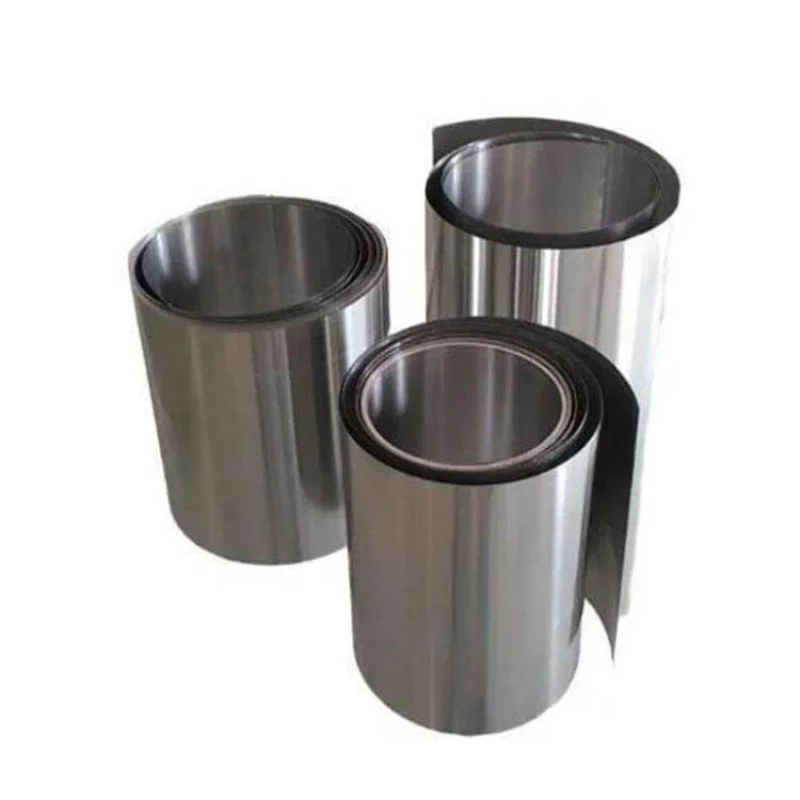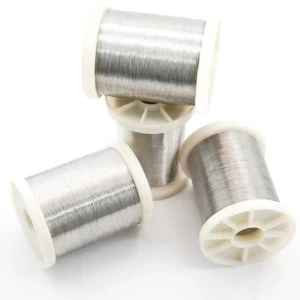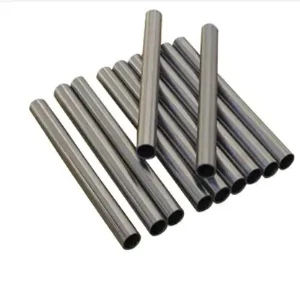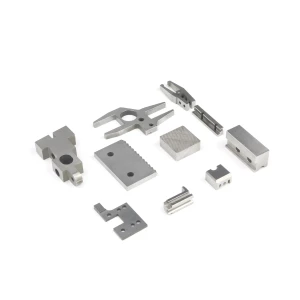We supply a wide range of Niobium Foil (Niobium Strip) which are highly acclaimed by our clients due to its good luster, ductility, high conductivity and high quality.
Niobium foil strips
We offer a variety of niobium foils (Niobium strips), which are well received by customers due to their good gloss, good ductility, high conductivity and good quality.
Definition and basic properties
Niobium foil is a thin sheet material made of metallic niobium (Nb). Niobium is a silver-grey, soft transition metal. Niobium foil has typical metal properties, with a density of 8.57g/cm³ and good electrical and thermal conductivity. Its high melting point, reaching 2468℃, allows niobium foil to maintain a certain physical stability even in high temperature environments.
In terms of chemical properties, niobium foil has good resistance to many chemicals at room temperature. It has good corrosion resistance and strong corrosion resistance to acids and alkalis, especially in some oxidizing acids (such as nitric acid) and alkaline solutions. It can remain relatively stable. However, it may react with some gases (such as oxygen, chlorine, etc.) at high temperatures.
Production method
Rolling process: This is one of the more common methods for producing niobium foil. First, the niobium ingot is heated, and then its thickness is initially reduced by hot rolling to form a thicker plate. Then cold rolling is carried out. The cold rolling process requires precise control of parameters such as pressure and rolling speed to ensure that the thickness of the niobium foil is uniform and the surface quality is good. Through multiple cold rolling, the plate can be processed into niobium foil of the required thickness, generally a few microns to tens of microns.
Sputtering process: In some special application scenarios, such as in electronic devices, when there are high requirements for the purity and microstructure of niobium foil, the sputtering process is used. This process uses ion beams to bombard niobium targets in a vacuum environment, so that niobium atoms are deposited on the base material to form niobium foil. This method can accurately control the thickness and purity of niobium foil, and can form a good bond between niobium foil and the base material.
Application field
Electronic industry: Niobium foil is widely used in the electronics field. In superconducting electronic devices, niobium is an important superconducting material, and niobium foil can be used as the basic material for superconducting thin films. Due to its relatively high superconducting transition temperature, niobium foil can achieve zero resistance conduction when cooled below a certain temperature, and can be used to manufacture high-precision electromagnetic measuring instruments such as superconducting quantum interference devices (SQUIDs). In addition, niobium foil can also be used to manufacture capacitor electrodes, using its good conductivity and chemical stability to improve the performance of capacitors.
Aerospace field: In some parts of aerospace engines, niobium foil can be used as a thermal protection material or thermal insulation material. The high temperature generated when the engine is working needs to be protected by effective thermal insulation measures to protect the surrounding parts. The high melting point and certain thermal insulation properties of niobium foil enable it to play a role in this regard. At the same time, in the electronic system of aerospace vehicles, niobium foil can also be used for electromagnetic shielding to prevent electromagnetic interference in the space environment from affecting the electronic equipment of the aircraft.
Medical field: In terms of medical equipment, niobium foil can be used to manufacture some parts of implantable medical devices. Due to its good biocompatibility and corrosion resistance, niobium foil will not cause obvious adverse stimulation to human tissues, and can remain stable in the complex chemical environment in the human body. For example, in devices such as pacemakers, niobium foil can be used as electrodes or circuit connection components to ensure that the equipment works stably and long-term in the human body.
Applications:
Niobium foil (niobium strip) is very stable and can therefore replace stainless steel for inorganic acid production, increasing machine life several dozen times. Other applications include chemistry, welding, nuclear industry, electronics, optics, numismatics and jewelry. Niobium's low toxicity and anodizing coloring ability are its special advantages. Our high-quality niobium foil is widely used in corrosion protection, capacitors, optical targets, superconductors, medical, refrigeration, etc.
Packaging:
We make every effort to deliver our products to you using the most appropriate and safest means of transport, making the process of receiving the project simple and safe. On site, we carefully pack, load and secure all orders, personally confirming that the goods are safe, protected and complete.
Content, Max, Weight %
Element
R04200
R04210
R04251 (Reactor grade niobium-1% Zirconium)
R04261 (Commercial grade niobium-1% Zirconium)
Unalloyed Niobium
Unalloyed Niobium
C
0.01
0.01
0.01
0.01
O
0.015
0.025
0.015
0.025
N
0.01
0.01
0.01
0.01
H
0.0015
0.0015
0.0015
0.0015
Fe
0.005
0.01
0.005
0.01
Mo
0.01
0.02
0.01
0.05
Ta
0.1
0.3
0.1
0.5
Ni
0.005
0.005
0.005
0.005
Si
0.005
0.005
0.005
0.005
Ti
0.02
0.03
0.02
0.03
W
0.03
0.05
0.03
0.05
Zr
0.02
0.02
0.8~1.2
0.8~1.2
Nb
Remainder
Remainder
Remainder
Remainder
Dimensions and Tolerances of Niobium Plate/Sheet/Foil:
Product name
Niobium Foil Niobium Strip
Purity
Nb ≥99.95%
Grade
R04200, R04210, R04251, R04261, Nb1, Nb2
Standard
ASTM B393
Size
Customized size
Melting point
2468°C
Boiling point
4742°C
Advantage
Low Density and High Specificate Strength
Excellent Corrosion Resistance
Good resistance to effect of heat
Nonmagnetic and Non-toxic
High melting point, good anti-corrosion, excellent super-conduction and other unique characteristics.
Application
Electronic industry, Chemistry, Electronical, Pharmaceutical industry.
Steel, Ceramics, Electronics, nuclear energy industries and superconductor technology.
Super condouctous, metled cast ingots and alloying agents.
Widely used in manufacturing various kinds of alloy steel, high temperature alloy, optical glass, cutting tool, superconducting materials and other industries.
Thickness
Thickness Tolerance
Width
Width Tolerance
Length
Length Tolerance
Ⅰ
Ⅱ
0.01~0.02
±0.002
±0.003
30~300
±2.0
>300
--
>0.02~0.05
±0.003
±0.005
30~300
±2.0
>300
--
>0.02~0.05
±0.005
±0.006
30~300
±2.0
>300
--
>0.05~0.07
±0.006
±0.015
30~300
±2.0
>300
--
>0.07~0.1
±0.015
±0.02
50~450
±3.0
100~10000
±3.0
>0.1~0.2
±0.02
±0.03
50~450
±3.0
100~10000
±3.0
>0.2~0.3
±0.03
±0.04
50~450
±3.0
100~10000
±3.0
>0.3~0.5
±0.04
±0.06
50~450
±3.0
50~2000
±3.0
>0.5~0.8
±0.06
±0.08
50~650
±3.0
50~2000
±4.0
>0.8~1.0
±0.08
±0.12
50~650
±6.0
50~2000
±4.0
>1.0~1.5
±0.12
±0.16
50~650
±6.0
50~2000
±4.0
>1.5~2.0
±0.16
±0.018
50~650
±6.0
50~2000
±4.0
>2.0~3.0
±0.018
±0.20
50~650
±6.0
50~2000
±4.0
>3.0~4.0
±0.20
±0.24
50~650
±6.0
50~2000
±4.0
>4.0~6.0
±0.20
±0.24
50~650
±6.0
50~2000
±4.0
We have more categories for you. lf you can't find the products you want above,just fill in the form and tell us whatproducts you want to import from China.
















